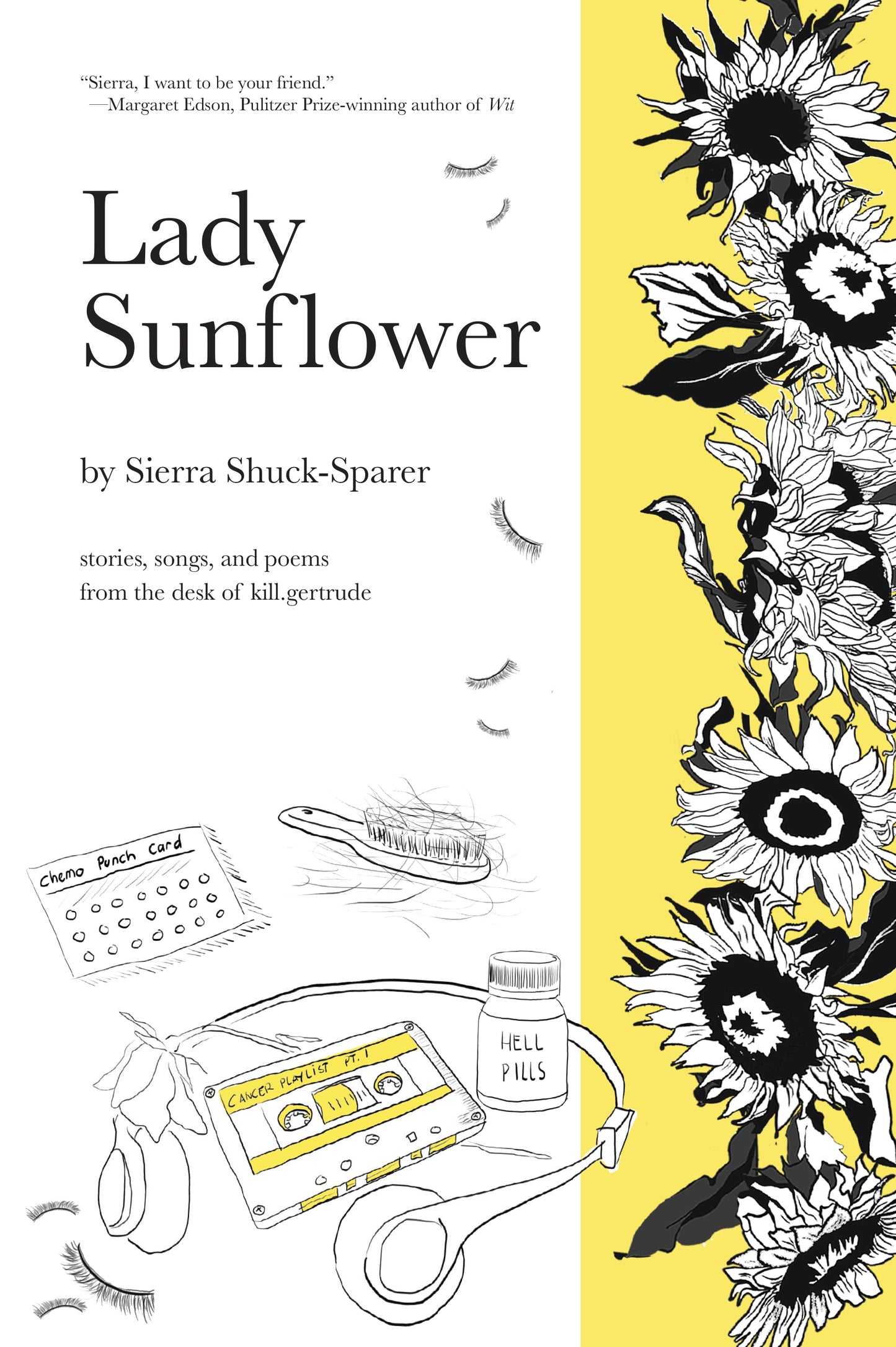“Sierra, I want to be your friend.” —Margaret Edson, Pulitzer Prize-winning author of Wit
“Sierra Shuck-Sparer is one of the leading, young writers of her generation—this book will be part of her legacy.” —Indya Kincannon
Lady Sunflower is an achingly poignant collection written by Sierra Shuck-Sparer when she found herself grappling with the unimaginable: high-risk medulloblastoma. At the age of fifteen, Sierra was thrust into her harrowing battle against Gertrude (the name she gave her cancer). She faced relentless treatments and surgeries all while trying to retain her identity as a teenager heading into her college years. Sierra chronicled her journey through diagnosis, relapses, and treatment stages using a remarkable blend of heart-rending poetry, introspective essays and songs, zines, and curated playlists. This collection is a radiant call to raise awareness about pediatric cancer and a moving glimpse into Sierra’s humorous, heartbreaking, and sanguine view of the world around her.
Sierra
Shuck-Sparer is a part-time poet and artist and a full-time student at the
Georgia Institute of Technology, majoring in healthcare and public policy.
She enjoys making earrings and other art, collecting tiny things, reading,
and making random movie references from the 20 movies she watches over and
over again (“You were right, I was less right”). When she’s not at school,
she lives in Knoxville, TN, with her cat, beagle, brother, parents, and
Gertrude, who she has known for years and is continuing to try to evict.
Chloe Tyler fell in love with art in high school and within a matter of months, it became her entire life. Drawing with charcoals, painting with oils and acrylics, doing portraits, murals, figure drawing, she threw herself into anything she could get her hands on. Chloe attended the University of Georgia and studied fine art and graphic design. It was here that Chloe learned how to take her art from the canvas to the screen. Digital art introduced Chloe to a whole new world of endless creative opportunities. She went on to find her artistic niche in-between the two worlds of digital and fine art. She graduated from college in 2019 with a BFA in fine arts and an emphasis in graphic design, and is now an artist living in Nashville, TN. Chloe is inspired most by color and music—both of which are in abundance in the city of Nashville. She is very excited to see what is in store for her artistic career. Chloe spends her free time painting in her tiny reading-nook-turned-studio in the corner of her room, as well as looking for other people’s dogs to play with (at least until she can get her own).
Review text
A young Knoxville, Tennessee, woman chronicles living with the life-threatening brain cancer she names Gertrude.
In 2018, bright, ambitious Shuck-Sparer, then 15 and a competitive swimmer and ice skater, was diagnosed with high-risk medulloblastoma, a brain cancer that required grueling surgeries, radiation, and chemotherapy. After initially undergoing surgery and seven months of chemotherapy in Memphis, Sierra relapsed, endured another round of treatment during her senior year of high school, graduated on time, and then headed to Atlanta to attend Georgia Tech. When the Covid-19 pandemic sank her original dream of visiting Japan on a trip sponsored by the Make-a-Wish Foundation, she pivoted to using her wish to create this memoir of life with Gertrude, which she’d been chronicling on her Instagram account, kill.gertrude. This work is enlivened by wry comments on treatment protocols and practical tips for surviving them, along with Tyler’s black-and-white illustrations. Rants and laments, rhymed and studded with bitter humor, give way to plangent sorrow for a lost future, like the fallen hair on her pillow, which Shuck-Sparer captures with a lint roller: “It comes right off, as if it is dust. // Somedays I feel like I am dust, / Fighting against the wind to stay where I am.” By turns passionate, wistful, furious, heartbroken, and courageous, the author has a message for readers: “I want to put enough of myself into the world so that when I’m gone, you’ll remember me.” Mission accomplished.
Haunting. —Kirkus Reviews
Review text
As a high-school sophomore, Shuck-Sparer began experiencing dizzy spells. The initial diagnosis was a concussion, but an MRI revealed she had medulloblastoma brain cancer, an aggressive disorder with a 30 percent long-term rate of survival. She immediately began a grueling rotation of operations, chemo, and radiation to combat her brain tumor, an entity she named Gertrude. In this engaging collection of poems, drawings, reworked song lyrics, humorous observations, and serious reflections, Shuck-Sparer documents her ongoing battles with Gertrude. Her tone fluctuates with her varying physical and emotional states; her determination, strength, and honesty are constant. Sometimes she comes across as a typical teen, mourning the loss of her eyelashes and creating playlists; other entries reflect harsher realities as she endures treatments and describes harrowing side effects. Some pieces, including the title piece, are breathtaking in their beauty and perception. Since Gertrude’s arrival about five years ago, Shuck-Sparer, currently a college student, has gone through three months-long treatment cycles. She is determined to eradicate Gertrude and become an oncologist. She shares her story with wit as she gracefully embraces hope. —Booklist
Review text
A young adult shares her experience as a teenager undergoing cancer treatment. This memoir, told in poems, doodles, line drawings, journaling, essays, speeches, and playlists, is essentially positive, an expression of love and optimism. Using art and journaling as therapy enabled Shuck-Sparer to explore the battle between hope and fear, and to ask the unanswerable question, “Why?” Not “Why me?” but why does anyone, especially a child, have to suffer from cancer? Shuck-Sparer refers to her brain tumor by name, Gertrude, and writes about her struggles with her named enemy. Although the unfairness of cancer is addressed, as well as the feeling of being broken (losing her hair, eyelashes, and brows) and left behind as her peers move forward from the teen years into adulthood, she uses imagery and lyrics evocative of nature, summer, and sunflowers as transformative, contemplative expressions. The music, cultural references, and artistic style are both broad and deep, illustrating the author’s interests. Shuck-Sparer wanted to help others navigate the often perplexing world of healthcare, and her own experiences as a cancer patient motivated her to pursue an education in healthcare and public policy. In her college application essay, she stated, “Getting through cancer was hard, but living after it was even harder.” Sadly, the author died in March 2024, a few weeks after the publication of this book. VERDICT Recommended for high school libraries as a memoir that may offer words of encouragement to those ailing, grieving, or seeking inspiration.
Review text
"Lady Sunflower is a poignant memoir that I could not put down."
—YA Books Central





